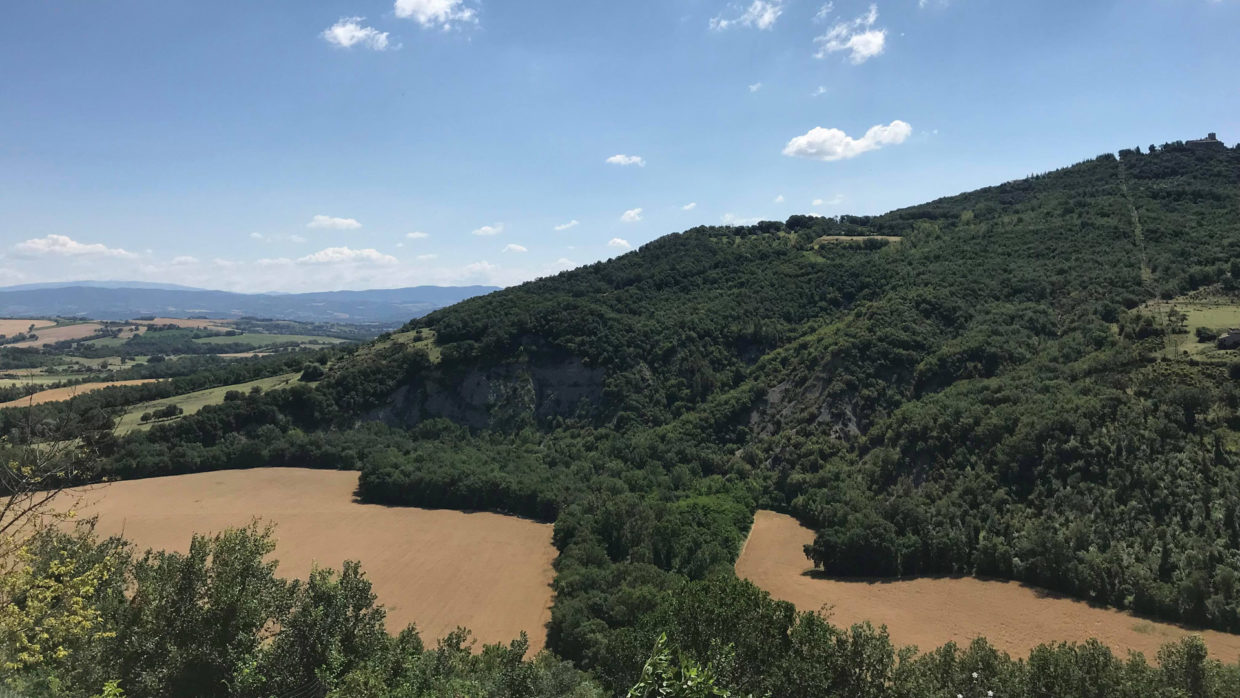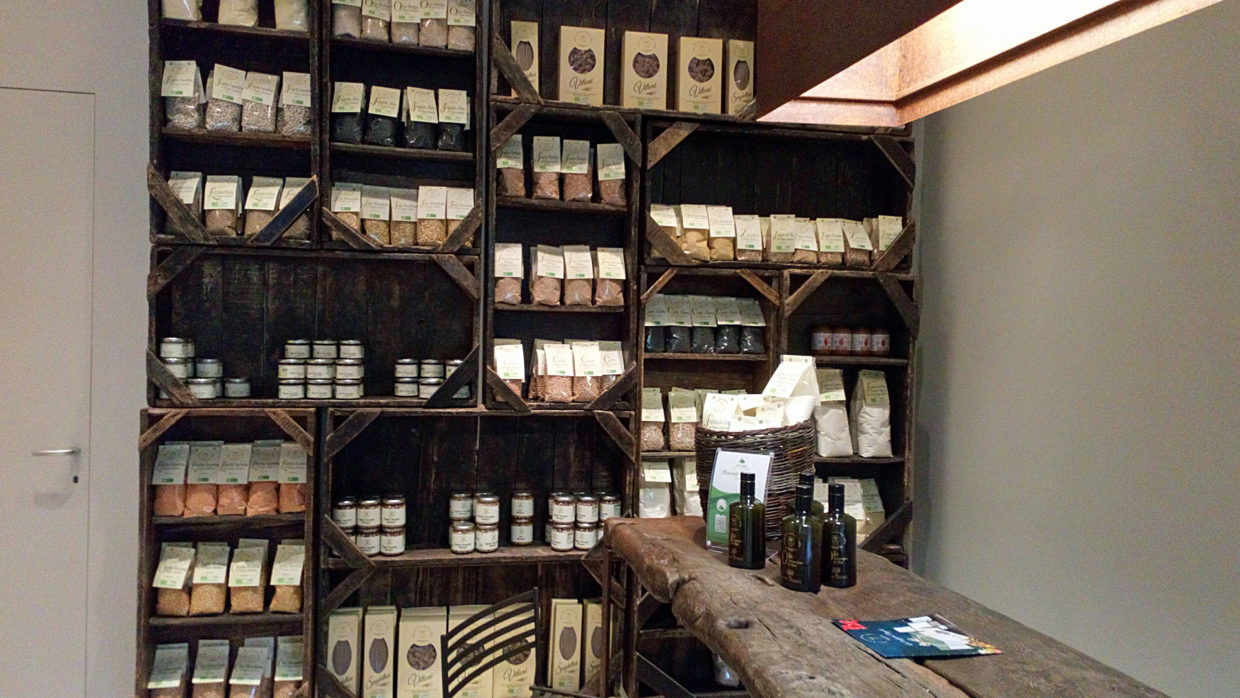Imagine all that is good about Italian food: The best pasta, beef, olive oil, pulses and risotto. A wide variety of products – and yet one farm in the rolling hills of Umbria produces them all. Welcome to Bio Alberti, a family-run organic farm that is enough to make your mouth water.
For the region, this is a big farm: 560ha, much of which is in a rotation of cereals, pulses and grass leys, alongside more ancient olive groves. Organic for the past 21 years, this farm is a pleasant combination of ancient and modern: Traditional farming practices meet modern processing techniques, while the burgeoning business both regenerates the tiny stone-built village around it and reaches out to the global marketplace.
This is a true family enterprise – it’s been in the family since 1940, passing through the hands of Guido and Paola Alberti towards their children, Andrea and Benedetta. “My father studied agriculture at university and is an agronomist – he knows a lot of stuff which I have to learn,” admits Andrea. “But I studied economics and business administration at Rome University, and I’m doing the international sales, travelling to London and other places as well as working on the farm. It’s nice, because you’re not doing the same thing every day.”

Andrea Alberti studied in Rome, travelled through Europe and now looks after the farm, which has been family-owned since 1940.
Olive oil taste test
Benedetta handles the Italian sales, and recently trained as an olive oil sommelier in order to improve the quality of the farm’s olive oil. “It’s more difficult to produce than a field crop as you can’t control the pests and diseases – some years you don’t get any crop at all as you don’t want to sell a bad oil,” says Andrea. “Yields vary wildly from one year to the next, but we are trying to improve the quality and consistency.”
The farm has 4000 olive trees, the fruits from which are hand-picked and cold pressed locally within 48 hours to preserve their quality, but we press them within 12 hours. “You should choose your olive oil like you choose wine – you need a different oil for fish than a salad, and we have four different varieties. We sell extra virgin olive oil through a distributor to the UK, France, Norway, US, China, and Czech Republic – around 40% of our sales are overseas and 60% domestic.”
Due to a mixture of good marketing and a respect for the environment, the family has adopted a range of traditional farming practises, including growing monoccocum spelt – the oldest cereal in the world. “It was grown in Roman times, and has a small grain with a low yield, but it is good for risotto and an alternative to wheat flour. We started out by growing 1x1m trials for a project with the University of Perugia and now we grow 20ha of it.”
Co-cropping wheat
Andrea also grows a lot of traditional wheat varieties – but not by themselves. Instead, he prefers to co-crop them in the field. “It’s better to mix in the field than in the mill – it outcompetes the weeds and you can get better yields.” One such mix this year is a third each of Verna, Gentilrosso soft wheat and durum wheat – the resulting flour is ideal for breads, pizzas and pastas.
The business sells through its own website as well as through retailers, wholesalers and restaurants, and a jewel in its crown is Senatore Cappelli, an ancient durum which was rediscovered only a few years ago. “We used to produce a lot in southern Italy, and although it has lower yields than modern varieties, at around 2-2.5t/ha, it makes a great pasta – you can really see the difference in the colour alone,” says Andrea.
It’s better to mix in the field than in the mill – it outcompetes the weeds and you can get better yields.
Andrea Alberti
Given its organic status, the farm has a strong rotation including lentils, chickpeas, chickling, borlotti, black and cannellini beans, and millet. “We use the same drill for them all, but each year we try different techniques. Last year we drilled the lentils one month early to see if they’ll be any better, while with the spring-drilled millet we left the autumn regrowth and harrowed before drilling,” says Andrea.
“We also use the same combine for everything but we need to clean it carefully.” Cereals are cut around the end of June, while the legumes are cut in July. “At the moment we don’t have separate cleaning machinery for gluten-free legumes, so that will be the next investment.”

Around 250ha of the farm goes down to a herbal grass mix, which is either grazed or cut for hay to feed the 200 Chianina beef cattle.
Processing and packing
The grain store sits alongside the small processing facilities, with 10 silos for different products and temperature-controlled storage at 18°C. All of the products are produced locally and packed by hand.
In keeping with its organic status, the farm hosts 50 beehives for a local beekeeper. It also has access to irrigation through two lakes, although the cereals and legumes generally don’t require it, given that Umbria is one of the wettest counties in Italy, earning it the moniker ‘the green heart of Italy’.
Around 250ha of the farm goes down to a herbal grass mix, which is either grazed or cut for hay to feed the 200 Chianina beef cattle. This ancient breed is probably best known for its use in the recipe Bistecca alla Fiorentina (Florentine steak) which use a thick-cut porterhouse steak, cooked rare and flavoured simply with salt and pepper.
We believe in organic for our food, and feel it’s really important for the environment – we hope it will be the future for our people.
Andrea Alberti
“We calve all year round and keep two dairy cows as sucklers as the Chianina don’t produce much milk – the calves just suckle the dairy cows direct,” says Andrea. “We’ve got two bulls and finish the progeny at around 20 months old off grass – we don’t feed any concentrates.”
In a bid to close the loop, the family plans to open a restaurant in the tiny village of San Venanzo, where they already run farm-stay accommodation. “There are only 24 inhabitants in the village; we’ve got five agriturismo apartments and are renovating the dilapidated old house too. We believe in organic for our food, and feel it’s really important for the environment – we hope it will be the future for our people.”



